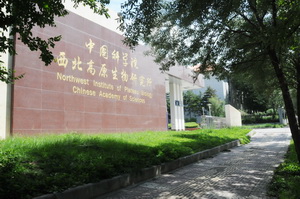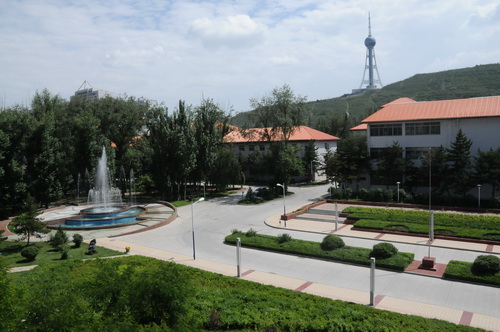 Northwest Institute of Plateau Biology (NWIPB), Chinese Academy of Sciences (CAS), a comprehensive institute established in 1962, is engaged in fundamental and applied research on plateau ecology, biological resources and plateau ecological agriculture. Its scientific research areas include alpine meadow ecosystem, alpine mammals, alpine agriculture, plateau biological resources in the Qinghai-Tibetan Plateau, etc.
Northwest Institute of Plateau Biology (NWIPB), Chinese Academy of Sciences (CAS), a comprehensive institute established in 1962, is engaged in fundamental and applied research on plateau ecology, biological resources and plateau ecological agriculture. Its scientific research areas include alpine meadow ecosystem, alpine mammals, alpine agriculture, plateau biological resources in the Qinghai-Tibetan Plateau, etc.
Aiming at providing valuable data and technical support for sustainable development and utilization of biological resources in the Qinghai-Tibetan Plateau, NWIPB was in the first stage of academic construction from 1962 to 1978. The second was finalised by the end of 1997. NWIPB implemented the Knowledge Innovation Program of the CAS in 2002.
"One-Two-Three” Strategic Planning, an agenda proposed in 2011 to strengthen the core competence of NWIPB, means “one clearly-defined positioning, two major breakthroughs, and three top priorities”. One clearly-defined positioning: Biology in the Tibetan Plateau; two breakthroughs: Regional Sustainable Development - Sustainable Management Technology of Alpine Grassland Ecosystem, Tibetan Medicine Modernization - Safety Evaluation Technology of Heavy Metals; three directly supporting: Adaptive Evolution and Molecular Breeding of Plateau Biota, Sustainable Development and Utilization of Qinghai-Tibet Plateau Biological Resources, and Physiological Response of Alpine Meadow to Climatic Change.
In the past half century, NWIPB has accomplished 361 important research achievements and 138 prizes at national, CAS and provincial levels, e.g. A Worldwide Monograph of Gentiana won a Second Prize of the China National Award for Natural Sciences in 2004, Research and Industrialization of Integrated Using Technologies of Nitraria Resources from Qaidam Basin won a Second Prize of the National Science and Technology Advance Award in 2007, Spring Wheat “Plateau 602” in 1987 won a Third Prize of the National Science and Technology Advance Award.
Since 1962, NWIPB has 76 patents authorized, 4,144 papers, 135 monographs published, and 41 new crop varieties.
NWIPB is affiliated with 3 research centers of Plateau Ecology, Biological Resources and Plateau Eco-agriculture. Facilities include 4 field research stations (Haibei Research Station of Alpine Meadow Ecosystem, Grassland Ecosystem Research Station of Three Rivers’ Source Regions, Ping’an Station of Ecological Agriculture and Wuwei Research Station of Modern Eco-agriculture), 2 key laboratories at CAS level (Key Laboratory of Adaptation and Evolution of Plateau Biota and Key Laboratory of Tibetan Medicine), 4 key laboratories of Qinghai Province (Qinghai Key Laboratory of Restoration Ecology for Cold Regions, Qinghai Key Laboratory of Tibetan Medicine Pharmacology and Safety Evaluation, Qinghai Key Laboratory of Qinghai-Tibet Plateau Biological Resources and Qinghai Key Laboratory of Crop Molecular Breeding) and 2 engineering research centers (the Engineering Research Center of Characteristic Biological Resources of Qinghai-Tibet Plateau and Huzhou Industrial Innovation Center of Plateau Biological Resources).
Furthermore, The Qinghai-Tibetan Plateau Museum of Biology (QPMB) has the most amounts of biological specimens of Qinghai-Tibetan Plateau in the world. Acta Theriologica Sinica is an academic journal of Mammalogy founded in 1981 with international interests and an internationalized editing board. The Analytical Testing Center is an important technical platform for the scientific innovation of the institute.
In December 2013, there are 95 employees including 163 research staff in NWIPB, among which 1 CAS academician, 36 professors, 49 associate professors, and 80 talents with PHD degree.
NWIPB offers Ph.D. degree conferred in the fields of Ecology, Biology, and the M.S. degree conferred in Ecology, Botany, Zoology, Chinese Pharmacology. There are also postdoctoral research opportunities in Ecology, Biology.
By the June of 2013, a total of 342 and 134 candidates had received their master's and doctoral degrees respectively from NWIPB, 28 postdoctoral researchers and over 200 visiting researchers worked and have been working at NWIPB.
NWIPB attaches great importance to cooperating with scientists around the world. Since 1980s, NWIPB has established long-term friendly cooperative relationships with USA, UK, Germany, Sweden, Russia, Australia, etc., promoting exchanges and cooperation on biological diversity, animal evolutionary adaptation, physiological response of plants to climatic change, plant systematics, traditional Chinese pharmacy and migrant bird behaviors/virology in high-latitude and similar environments.
NWIPB, facing a new era of development, is looking for international cooperation in following research areas: 1) alpine plant evolution and adaptation, 2) ecosystem process/function under global climate change, 3) germplasm creation and breeding of high-yield alpine crops and forage grasses, 4) sustainable utilization and product development of plateau biological resources and 5) development and introduction of sustainable alpine ecosystem models and technologies.

